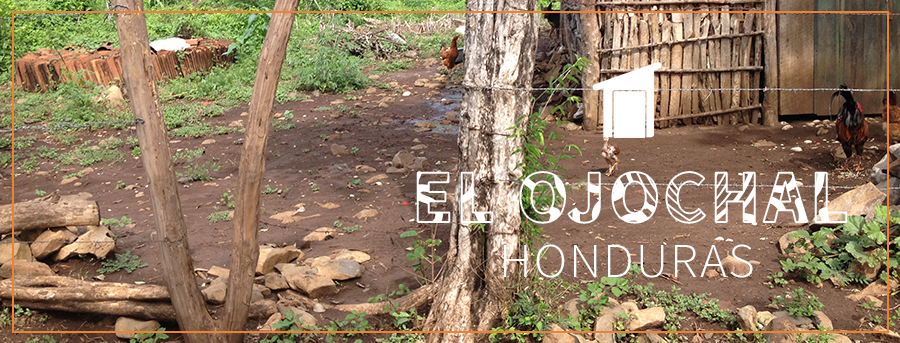
About El Ojochal
El Ojochal is a community with a population of 209 people living in
approximately 50 homes. It is an extremely rocky community,
belonging to the municipality of Amapala in the department of Valle.
El Ojochal is primarily an agricultural community, mainly harvesting
corn and melons. Many community members also work in the
shrimp industry, although this work is seasonal. In El Ojochal, there
is a school which has kindergarten through 6th grade and an active
Water Council, Basic Sanitation Committee, and Caja Rural.
El Ojochal was inaugurated in August 2014 to be a holistic
community since Medical/Dental, Water, Microfinance, Public
Health, and Architecture Brigades are all completed.
El Ojochal's Public Health Challenge
Many community members in El Ojochal lacked the resources
needed to improve their homes and prevent diseases caused by
unsafe living environments. Prior to the arrival of the Public Health
Brigades in 2013, most homes lacked latrines and showers, forcing
community members to relieve themselves and bathe outside.
Similarly, most community members could not safely store their
water, which increased the risk of waterborne disease. Further
imperiling community members' health, the majority of homes
had dirt floors and traditional stoves, resulting in both parasitic
infections such as Chagas Disease and respiratory problems
respectively. The creation of health infrastructure not only
bettered the health of communtiy members through improved
sanitation and hygiene, but also improved their quality of life as
the projects also reduced time spent collecting firewood for
cooking and environmental destruction in their community.
Although community memebrs recognized the problems inherent to their living environments, they did not have the economic resources nor the technical knowledge needed to address them. Moreover, the level of awareness concerning sanitation and the importance of health was very low as the children did not receive any education about the topic prior to the entry of the Public Health Program.
The Public Health Solution for El Ojochal
Public Health Brigaders from several different universities and the Public Health Brigades in-country team worked in El Ojochal from June 2013 – April 2014. During this time, volunteers and staff members worked with community members to:
• Identify community leaders and train them to form the Basic Sanitation Committee
• Increase cultural sensitivity and awareness by working side by side with qualified masons and
project beneficiaries
• Build over 50 eco-stoves, 50 latrines, 50 hygiene stations, and hundreds of square meters of cement floor
• Conduct educational workshops emphasizing the importance of sanitation and hygiene in local
primary schools
To ensure the sustainability of the in-home infrastructure projects, the Public Health Program provides continuous follow-up in the community. It also forms and trains the Basic Sanitation Committee, a community body formed by local leaders which is entitled to monitor the correct utilization and maintenance of the infrastructures. Clear responsibilities and powers are assigned to each member, making the beneficiaries themselves an even stronger stakeholder of the Public Health projects.
| Public Health Brigades Chapters that Worked in El Ojochal |
||
| Public Health Brigades Chapter | Month | Volunteers |
| University of Washington | June 2013 | 15 |
| UC San Diego | June 2013 |
25 |
| DePaul University | June 2013 | 7 |
| Wayne State | August 2013 | 13 |
| Greater Piedmont/UC Berkley Post Bacc | August 2013 | 41 |
| Explore Honduras/University of Houston | August 2013 | 12 |
| Imperial | September 2013 | 49 |
|
DePaul University |
December 2013 | 19 |
|
University of Illinois - Chicago |
December 2013 | 40 |
|
UNC Wilmington |
December 2013 | 4 |
|
St. Louis University |
January 2014 | 21 |
|
Brandeis University |
January 2014 | 13 |
|
Albion College |
January 2014 | 16 |
|
Harvard University |
January 2014 | 32 |
|
St. Olaf University |
February 2014 | 16 |
|
College of William and Mary |
March 2014 | 19 |
|
Indiana University |
March 2014 | 27 |
|
University of Arizona (Professional) |
March 2014 | 19 |
|
Acadia University |
April 2014 | 31 |
Current Status
COMPLETE
After numerous successful brigades, the Public Health program exited the community of El Ojochal in April 2014. Exiting the community signifies that the program will no longer be bringing brigades to the community and will gradually lessen the follow-up visits to once every 6 months-1 year. The Public Health program trusts that the community members will maintain their projects with the assistance of the trained Basic Sanitation Committee and understand the importance of building safe living environments whenever they construct new homes.
Visit Other Programs in El Ojochal
Global Brigades strives to implement a model of Holistic Development in communities through a system of collectively implementing health, economic, and education initiatives so strategically meet a community's development goals. Learn more about the other programs being implemented in El Ojochal:
![]() Medical
Medical![]() Dental
Dental![]() Engineering
Engineering![]() Microfinance
Microfinance![]() Water
Water ![]() Business
Business![]() Architecture
Architecture![]() CHW
CHW
| Project Overview | |
| Volunteers | 419 |
| Beneficiaries | 209 |
| Latrines |
47 |
| Stoves |
57 |
| Floors |
85 |
| Hygiene Stations |
47 |
| Hours of Education |
60 |
| Additional Information |
| General Community Profile |
| Public Health Methodology |
| Pre-Brigade Lesson Plans |
| Family Profiles |
| Education Profile |
